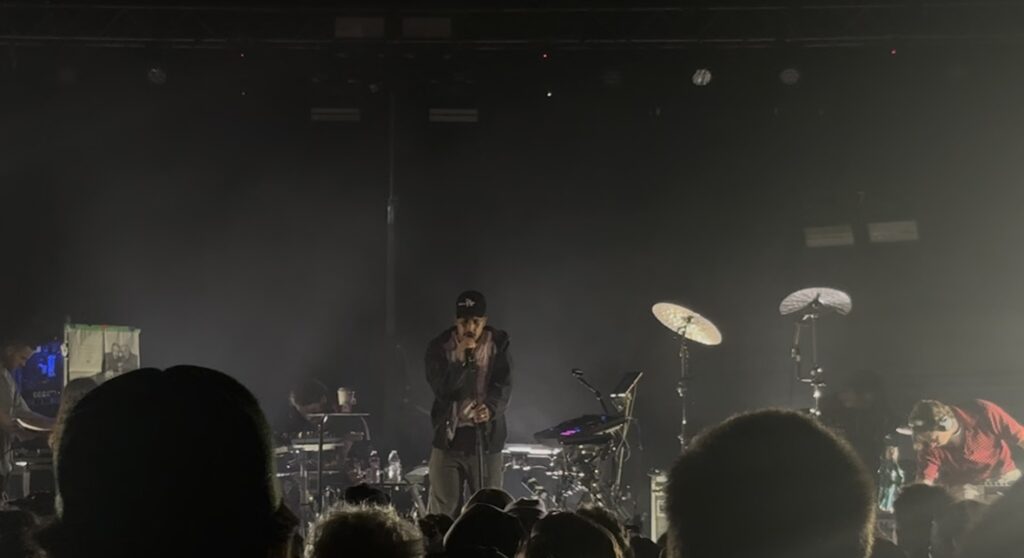After years of crying in my room to his first album, “Absolutely,” and memorizing the newest album, “Baby,” in preparation for this night, I prided myself on a sense of obligation to attend Dijon’s show during his tour at Soma Mainstage in San Diego two weeks ago.
Rather than a red carpet rolled out for me by Dijon himself for being such a loyal fan, I was welcomed with a line wrapped around the venue. A sea of Japanese denim, patchwork tattoos, loafers, microbangs and couples holding hands flooded my surroundings. I began to drown in the idea that this artist could be for anyone but me — and that everyone in this line was thinking the same thing.
Dijon offers music that is painfully human, intimate and subtly dramatic, which attracts those who indulge in that part of themselves. This was evident in his show that night, as I felt like I was a part of a listening party more than an actual concert.
There was no Justin Bieber, no screaming fans and no facades or costumes. Dijon walked out onto a dark stage in a T-shirt, jeans and a zip-up hoodie and transformed the massive blank space into what felt like a jam session in his living room. He sang, and people swayed. He played, and people smiled. There were breaks between songs that should have felt awkward yet forced us listeners to slow down and just be there with Dijon, strictly white lights highlighting him and his band’s silhouettes, and live mixing going on during the performance.

The crowd was respectful and clearly absorbing every sound with pleasure as I looked around at contented faces and inspired eyes. There was this silent tension in the crowd between the enjoyment of what was being heard in the moment and the anticipation for what Dijon was going to do next.
He played his top tracks, “Many Times,” “The Dress” and “Rodeo Clown,” which got the crowd singing and dancing along. His live mixing between each song had heads tilted, trying to decipher which song it could be transitioning into, paired with nods following as soon as the melodies became clear.
“HIGHER!,” “Baby!” and “Yamaha” from his recent album streamed like a wave of movement through the crowd. At other times, the slowness of “jesse,” “God in Wilson” and “do you light up?” pressed onto the crowd like a heavy heat of sorrow. Dijon guided us through a rollercoaster of emotions within an hour from his own creations, both preset and improvised live.
I entered this venue with a possessive attitude that was slowly stripped after hearing every song Dijon played and looking around at the community he brought together. I felt a deep admiration for the power of music and how eloquently Dijon has used it through his bittersweet lyrics, deep rhythms and aching voice — allowing humans to connect with their humanity. While watching an artist become someone who felt like it was just you and them to someone only attainable through sold-out shows, can be a shock, it forces one like me to truly appreciate the work of their craft.
Dijon, who is often associated with indie artist, Mk.gee, has collectively created an opening for people to explore a new sound in music. Their approach to music is so unique that the audience they are achieving is often those most open to exploring new and innovative ideas and approaches to art.
“It’s this weird tug and pull between feeling like no one hears this music the same way you do and also feeling happy that these artists are getting the recognition they deserve because it is so, so good,” said Isabella Jones, a fifth-year communication major at Point Loma Nazarene University who went to the concert. “And usually the recognition they’re getting is the same person in different fonts — that niche crowd.”
She explained this dynamic of supply and demand, in which once this indie-synth rock genre that Dijon and Mk.gee have created has been heard, people almost become religious about the artists because they are the only source who can supply.
On a compositional standpoint, Dijon and Mk.gee have blended the genres of soul, lo-fi, indie rock and techno to create this experimental sound that is addictive.
“You go to Dijon or Mk.gee’s concerts and you realize, it’s kind of just a bunch of weird sounds,” concertgoer Gibson Anderson said. “But it’s something no one else has thought to do before, and that’s why people love it.”
These sounds have intrigued enough people, like Justin Bieber, who brought Dijon and Mk.gee onto the creation of his album “SWAG,” which came out earlier this year and brought the spotlight to these artists.
“It’s cool to see this seep into mainstream music and pop artists like Justin Bieber,” Anderson said. “Music doesn’t have to be stuck within four walls of a certain genre; it’s inspiring to see artists experimenting again.”
